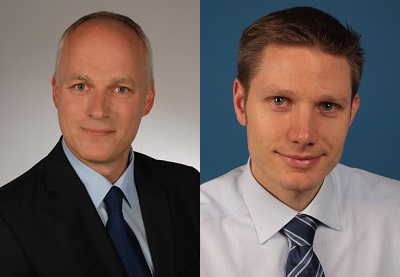18/01/2017
Print PageDKTK Freiburg: Richtzenhain Prize 2016 - Better treatment for acute leukemia

“The two prizewinners have systematically investigated the cause of this dangerous immune response,” says Michael Boutros of the German Cancer Research Center, who chaired the selection committee for the Richtzenhain Prize. “Building on their findings, they were able to develop a targeted new treatment that will be able to save many lives in the future. That is exactly the kind of research envisaged by the donors behind the prize, Walther and Christine Richtzenhain.”
For many patients with acute leukemia, a transplant of blood stem cells from a healthy donor is their only chance of recovery. However, in half of these stem cell recipients, the transplant triggers a dangerous response in the donor’s immune cells, which attack the recipient’s tissues. This “graft versus host disease” (GvHD) primarily attacks the skin, intestine and liver, and can lead to death in around 20 per cent of all stem cell recipients.
Inflammatory immune responses are often triggered by the activity of the Janus kinase family of enzymes. Nikolas von Bubnoff and Robert Zeiser therefore suspected that these enzymes might also be responsible for triggering the GvHD immune responses. They started by investigating the theory in mice that had received transplants of blood stem cells. They found that when the Janus kinase was blocked with the active substance Ruxolitinib, the animals suffered fewer GvHD symptoms and survived for longer.
Ruxolitinib is already licensed as a pharmaceutical drug, so the two Freiburg-based physicians were quickly able to test whether it also helps patients suffering from a severe form of GvHD. The treatment proved successful: 95 GvHD patients who had failed to respond to other treatments have since been treated with Ruxolitinib. Around 45 per cent of these patients are considered cured, while a further 35 per cent saw a reduction in their symptoms.
Because of these observations, treatment with Ruxolitinib has been included in the guidelines of the German Society of Hematology and Oncology (DGHO) for patients with GvHD who do not respond to steroids or other treatments. In addition, the two researchers have initiated prospective clinical trials intended to lead to Ruxolitinib being licensed to treat GvHD.
The two prizewinners, Nikolas von Bubnoff and Robert Zeiser, both work and conduct research in the Hematology, Oncology and Stem Cell Transplantation Department of the Internal Medicine Clinic I at the University of Freiburg. They are both members of the German Cancer Consortium (DKTK)
The Richtzenhain Prize, which is awarded by the German Cancer Research Center on behalf of the foundation set up by neurologist Walther Richtzenhain and his wife Christine, is presented annually. Every two years the winners are chosen from doctoral candidates based at research institutes in Heidelberg. In the other years, including this year, the winners are chosen from scientists all over Germany working in the field of translational cancer research. The aim of translational cancer research is to translate successful laboratory research into clinical practice. This year the prize is worth EUR 10,000.